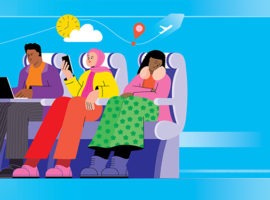Airline customer experience: How to win back the returning traveler
 With people traveling again, airlines have a huge opportunity to improve customer experience and build loyalty. Here's how they can get started.
With people traveling again, airlines have a huge opportunity to improve customer experience and build loyalty. Here's how they can get started.
In today’s hyper connected world, where every answer is a simple search query away, the real question is, how did that experience make you feel?
And maybe more to the point, did the interaction with that company make you feel heard?
Feeling heard creates emotions and connections that go beyond product features and benefits. It elicits feelings, memories, and desires to craft compelling narratives.
This is especially true when it comes intangible experiences like travel, which you can’t hold – they must be experienced.
There’s no shortage of emotional marketing examples, for good reason. This kind of marketing and CX helps brands make deep connections with customers to drive loyalty and sales.

Neuroscientific studies have shown that emotions play a crucial role in decision-making. When faced with a product or experience that evokes strong positive emotions, the brain releases dopamine, a neurotransmitter associated with pleasure, reward, and motivation.
This release can create a bond between the consumer and the product or service, often leading to purchase decisions.
Emotions also are incredibly effective in creating lasting memories. When consumers associate a positive emotion with a brand or experience, they’re more likely to recall it favorably in the future.
It’s why emotionally charged advertisements or marketing campaigns often enjoy long-term success and brand loyalty.
It’s estimated that people spend 20-30 hours planning a week-long trip – that’s almost a full business week of time devoted to a week of vacation. That anticipation is often what drives the satisfaction. For some, planning the trip is part of the enjoyment of travel.
Travel marketing also taps into another powerful emotion: escapism. Stunning visuals of distant landscapes and cultures promise a break from the mundane.
But it’s not just about relaxation; it’s also about transformation. Travel agencies sell experiences based on the idea of self-discovery, adventure, and personal growth. Their messaging often hinges on phrases like “Find Yourself” or “Escape the Ordinary.”
The underlying psychological appeal is the promise of a better, rejuvenated version of oneself, and the thrill of the unknown.
 With people traveling again, airlines have a huge opportunity to improve customer experience and build loyalty. Here's how they can get started.
With people traveling again, airlines have a huge opportunity to improve customer experience and build loyalty. Here's how they can get started.
Movie and cinema experiences are another example of emotional marketing. They tap into storytelling, evoking nostalgia, sentimentality, adventure, laughter, or horror. That emotional impact drives ticket sales.
Moreover, the communal aspect of watching a movie in a dark theater and sharing emotions with strangers reinforces our intrinsic need for connection. Studios market not just the film, but the shared experience and emotional journey it promises.
Gaming is a unique realm where players live myriad lives, face challenges, and achieve victories. Marketing in the gaming industry taps into the deep-rooted human desire for mastery and accomplishment.
Trailers showcase epic battles, strategic gameplay, and tantalizing rewards, instilling a sense of urgency and achievement. Special editions and expansion packs are marketed with the allure of exclusivity, making gamers feel part of an elite club.
The emotional payoff is the thrill of victory, the satisfaction of strategy, and bonding with fellow gamers.
 The more neuroscientists learn about the brain, the more social psychologists understand about consumer behavior, and the more marketers can apply these insights to branding and building customer trust.
The more neuroscientists learn about the brain, the more social psychologists understand about consumer behavior, and the more marketers can apply these insights to branding and building customer trust.
Home theaters represent the zenith of personal entertainment. Brands selling these systems tap into emotions of comfort, luxury, and ownership, making them a prime example of emotional marketing.
It’s not just about watching a movie; it’s about owning the cinematic experience and making it as immersive as possible. There’s a sense of pride in showcasing a state-of-the-art setup, and ads often depict families or friends bonding over a movie night, evoking feelings of togetherness.
The psychological strategy? Positioning the home theater as the heart of the home, a place where memories are made.
Emotions are powerful, intangible forces, much like the experiences many industries sell. Whether it’s the adrenaline rush of an epic game, the nostalgia of a classic movie, the allure of distant shores, or the cozy comfort of a home theater, emotions drive decisions.
And the best driver of these emotions is to let your customers know that they’ve been heard. So whether it’s taking the poorly reviewed product off your site or hiring real people to take customer service calls, being heard is what sells an experience and resonates with customers.